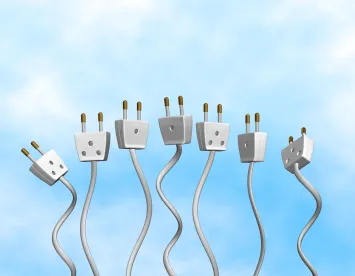From the clean energy components of the stimulus to the Paris Climate Agreement, President Obama staked a significant amount of his legacy on actions to reduce greenhouse gas emissions. How instrumental was opposition to these actions in electing Donald Trump? It is hard to say at this stage but President-elect Trump’s message of rolling back federal regulations—specifically, environmental regulations—that have stifled economic growth may have been one key factor in turning major portions of the “Rust Belt” from blue to red. Our expectation is that loosening regulatory restrictions on all aspects of the energy sector is likely to be an early and constant core element of Trump’s domestic policy agenda.
Against this backdrop, those interested in environmental policy should look at four key issues: the Clean Power Plan and climate policy; methane emissions and shale; appliance standards; and pipeline approvals.
The Clean Power Plan (CPP) and Climate Policy
President Obama's Clean Power Plan (CPP), the sweeping regulatory initiative designed to force utilities to reduce consumption of fossil fuels, is being challenged in the courts. Regardless of the outcome, we expect CPP to be the main initial target of the Trump team. The legal challenges to CPP will still be underway even as the new President is inaugurated. So, there will be options to potentially change or reach settlement on the rule. Even if the rule proceeds, a Trump administration can reopen the rule through rulemaking assuming their decision is based on substantial evidence in the administrative record.
Trump's comment in North Dakota that he would “cancel the Paris Climate Agreement” is expected to be another major aspect of his climate policy. It is important to remember that the Paris agreement was never submitted for ratification to the U.S. Senate and is explicitly described by the current administration as not being enforceable. Therefore, a Trump administration would have a good deal of flexibility in dealing with the agreement—even though the U.S. has made clear indications that Paris is part of U.S. foreign policy upon which some measure of credibility rests.
Methane Emissions and Shale Production
President-elect Trump has pledged to unleash domestic energy production onshore and offshore. Accordingly, we can expect the Trump EPA to halt or significantly alter current regulatory proposals to limit methane emissions from oil and gas production. Similarly, regulations promulgated by the Bureau of Land Management (BLM) on hydraulic fracturing on federal lands are currently under judicial challenge. Much like the CPP, expect a Trump BLM to reel in any legal defense of these regulations and ensure production on federal lands continues apace.
Appliance Standards
Often overshadowed by CPP, energy efficiency standards for appliances issued by the Department of Energy (DOE) were a major component of President Obama’s Climate Action Plan and the U.S. commitments under the Paris Climate Agreement. These standards were also a source of significant angst for residential appliance manufacturers who chafed at frequent rulemakings, revised test procedures, ever more stringent standards, and frequent DOE enforcement actions. Expect a Trump DOE to dial back the pressure on this portion of the manufacturing sector and work with industry closely on how best to balance the need for economic growth with achievable efficiency levels.
Pipeline Approvals
Between the Keystone XL pipeline and the Dakota Access pipeline, the environmental left has spent the past four years building up pipeline protests as ground-zero in the fight against fossil fuels. In many cases, these fights pitted the Democrat’s environmental and union bases against each other and may have contributed to union defections to Republicans in the 2016 election. For this reason, expect Trump’s domestic policy team to quickly make it clear that they intend to expedite approval of energy infrastructure such as pipelines.





 />i
/>i

